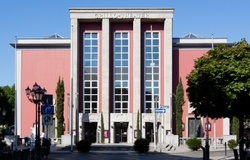
Grillo-Theater
In the location's words:
The Grillo Theater in Essen is one of the oldest theaters in the Ruhr region. It owes its name to a generous benefactor, the industrialist Friedrich Grillo, born in 1825 to an Essen merchant family. Grillo was one of the most important entrepreneurs and company founders of the 19th century in the Ruhr region. Through his diverse activities, e.g. as a member of the supervisory board of the "Bochumer Verein", a coal and steel group based in Bochum which included several steelworks and collieries, but also as a member of the mining board of the "Bergbaugesellschaft Neu-Essen" and founder of the Schalker Eisenhütte and the Gelsenkirchener Bergwerks-AG, he had a significant influence on the economic and structural development of the region.
But art was also very close to Friedrich Grillo's heart: in October 1887, he informed the Essen city council that he wanted to donate half a million marks, or even more if necessary, to his hometown for the construction of a theater and to pay for its upkeep for the rest of his life. However, before an official donation agreement was signed, Friedrich Grillo died in Düsseldorf on April 16, 1888. His widow, Wilhelmine Grillo, née von Born and daughter of bank founder Theodor von Born, kept her husband's promise. She donated the land for the building in I. Hagen and paid more than two thirds of the total costs, which amounted to 937,997 marks.
On September 16, 1892, the neo-baroque building, designed by the well-known Berlin theater architect Heinrich Seeling, opened with Lessing's "Minna von Barnhelm". A few years later, it was given an orchestra pit for opera performances and, with the population explosion after the turn of the century, it was already too small for the three sections of opera, dance and drama, so that the spoken theater was given its own venue in Hindenburgstraße in the 1920s.
In 1933, the Grillo-Theater - like all other theaters in Germany - came under the terror of the Nazi regime and lost more than just its Wilhelmine ornate façade during the Second World War. After an unprecedented reconstruction, the Grillo was reopened in 1950, now with a strictly functional neoclassical front, with a production of Richard Wagner's "Die Meistersinger von Nürnberg". However, the reconstruction was controversial, as even then there was a desire for a new opera house, which was not fulfilled until 1988 with the opening of the Aalto Theater.
In the young Federal Republic of Germany, the Essen stages regained national importance and recognition under the directorship of Dr. Erich Schumacher (1958-1974) and with chief dramaturge Dr. Ilka Boll. The productions by Erwin Piscator and Jean-Louis Barrault in particular, as well as Heinz Dietrich Kenter's production of Brecht's play "Der Kauskasische Kreidekreis", made a significant impact here.
In the mid-1980s, the Grillo Theater came under public scrutiny for completely different reasons: Due to safety deficiencies, the theater, which was in need of renovation, was threatened with closure. However, Hansgünther Heyme, director of the theater at the time, successfully prevented this in 1988. The renowned architect Werner Ruhnau, whose plans had already been used for the Stadttheater Münster and the Musiktheater im Revier (MiR) in Gelsenkirchen, was brought in to carry out the extensive renovation work. Ruhnau reduced the number of seats from 670 to 400, creating a modern, variable space theater that reopened in September 1990 with Shakespeare's "A Midsummer Night's Dream".
Similar pages
 Theater
Theater
Grend Theater
 Theater
Theater
Szene 10 - Bühne im Gir…
 Theater
Theater
Theater Courage - so sp…
 Theater
Theater
GOP Varieté-Theater Ess…
 Theater
Theater
Stratmanns Theater
 Theater
Theater
Theater Essen-Süd
 Theater
Theater
Rabbit Hole Theater
 Theater
Theater
Maschinenhaus Essen
 Theater
Theater
Zauber Theater Essen
 Theater
Theater
Katakomben Theater
 Theater
Theater
Casa - TuP Essen
 Theater
Theater
Studio-Bühne Essen
 Theater
Theater
Grillo-Theater
 Theater
Theater
Das Kleine Theater Essen
 Theater
Theater
Schauspiel Essen



